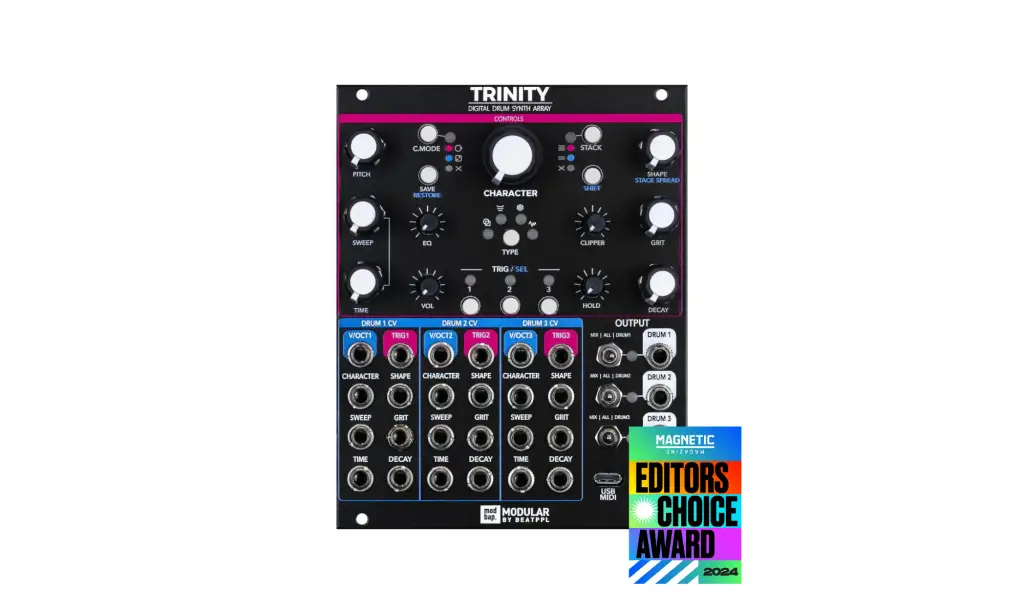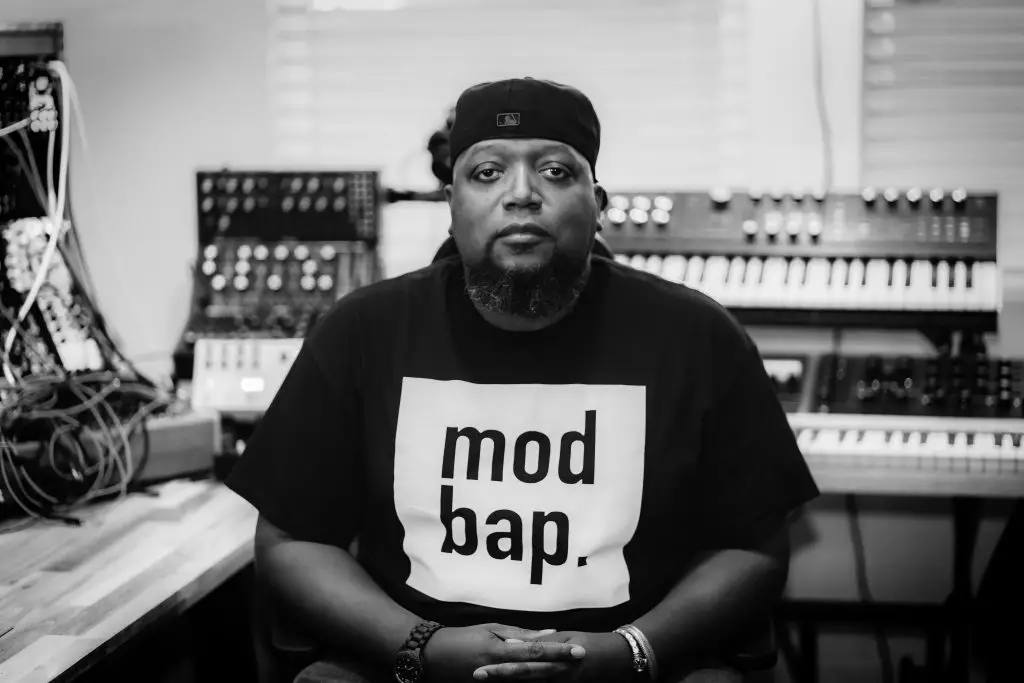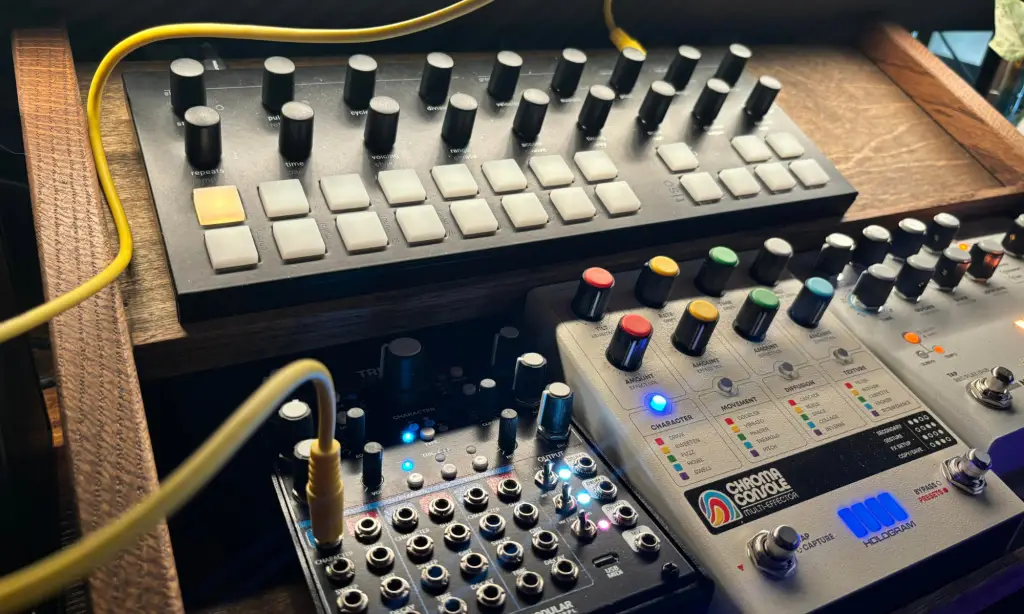You can look at some of the synth wizards in the industry, the Deadmau5s and the Hannes Biergers, with their walls of modular synths, and easily jump to the conclusion that modular synths aren’t for you. Maybe modular synthesis is too convoluted, maybe sound design on them is too obtuse, and maybe they are just too expensive of a piece of hardware even to consider.
You would have been right to assume much of this even ten years ago, but a lot has changed in the world, which has gone a long way toward making modular synthesis accessible to the masses. But it can still be a little disorienting to know where to start.
So after giving Modbap Modular’s Trinity Drum Synth an editor’s choice award for being an incredibly easy and approachable modular synthesis unit, I figured I should go directly to the source and find out how you, too, can dive headfirst into modular synth without breaking the bank or suffering too many migraines.
So let’s hear what they had to say when I asked them some of the more popular questions surrounding accessibility in modular synthesis.
How has the cost of modular synth equipment evolved over the years?
Great question. I believe that eurorack is and always will be an expensive niche interest or hobby. However, there are other special interests or sports, for example, like golf that are also quite costly. The initial cost of getting into modular can be exorbitant, but to me, it’s similar to when I was a teenager and wanted an MPC, but had to wait several years before I could save enough to afford one as a young adult. With modularity, there will always be the idea that you have to purchase all these “not-so-fun stuff,” like a case and power supply, before you get to the music-making “fun” things. I think it’s one of those things that depends on where your interests and passions lie to determine how appealing the entire thing might be for you.
Speaking of the evolution of the cost of modular synths, I’ve noticed a significant effort within our community to make it more accessible. There are now DIY kits, affordable educational modules or systems, and even more reasonably priced modules like Dreadbox’s colorful line of modules, 2hp, Erica Synths Pico line, etc. These initiatives have truly made modular more accessible, and I think there is a distinctive space in modular for the like.

Then there are the thoughtfully designed multifunction and “bang for your buck” sort of modules. Even if they appear to be more expensive and are perhaps considered premium, you tend to get more out of them. At the risk of appearing to be self-promoting, that’s something that I try to do with my Modbap modules. Sure, at the outset, something like Trinity appears to be more expensive, but the bullet points in the feature set aim to provide more value. For instance, Trinity is a drum voice module. While so many drum modules are a kick module, or a snare module, or a hats module, you need at least 3 different modules to have the sort of trifecta of drum instruments in your rack. Trinity, on the other hand, is a 3 channel drum voice that offers 4 great sounding powerful types of drum synth algorithms that can be assigned to any of the 3 channels.
The overall drum synthesis is more open-ended than kick – snare – hat; you can, with a bit of know-how, craft any type of drum sound with any of the 4 drum synth algorithms to be played on any of the 3 channels. That’s 3 channels of drum synthesis in one module. It may not be immediately obvious, but having one drum module that is equivalent to three separate ones, takes up less space, and costs less money than what initially seems like a more expensive module, has its own intrinsic value. The value proposition at that point becomes a 3-in-1 module for $600 or three separate modules for $1200. It’s about making informed choices in your modular journey. But it really depends on how you approach the idea of value and costs.
What are some effective strategies for building a modular synth on a budget?

I think before any moves are made, you have to be clear on your goals for your system. It’s so easy to get trapped in the hypnotic allure of all the things that appear unique, glossy, magical, and indispensable as you are starting your modular journey. If you approach it from the perspective that you have a goal to achieve, then you will likely walk towards the end game in that way without distraction. So, for instance, you may want to build only an audio processing and effects rack. Well, if so, that narrows things down considerably. Or you may build yourself a mono synth with mad modulation capabilities that aren’t typical in a standard synth with keys. Or you may decide to build yourself a drum rack. Or you may decide to build a really dope performance rack. All of those different rack ideas pose different questions and have different requirements and use cases despite the overlapping requirements like cases and power.
Once you have that figured out, you may want to explore which module(s) you want to center your build on. For instance, if you are building a mono synth, you may ask yourself what oscillator really appeals to your tastes and has the capabilities that you want in an oscillator. Then, you can build around that module.
Obviously, you will need to design on the size of the case and all of that but I think the best approach is to first be clear on what type of system you want to build that helps accomplish your desired outcome. That sets the tone for the system.
How important is prior knowledge of electronics in getting started with modular synths?

I don’t think you necessarily need any prior electronics experience to get into modular synths at all. If you are approaching it from a musical perspective or a music production and workflow perspective, and not from a DIY “I’m going to build all of my modules because that’s what I’m into” perspective, having electronics knowledge isn’t even a factor. I mean, think about it, you don’t need to be a mechanic to drive a car. You just need to know how to drive.
Similarly, with modular synths, you just need to know how to work the thing into your existing production workflow. Now, I know that in itself can present its challenges for those who see modular and feel overwhelmed, but I was told years ago in a recording studio in front of a patch bay, “signal comes from and it has to go somewhere.” The rest is a matter of experimenting and experiencing until you become comfortable and in the meantime, you will have happy accidents that inspire. It’s the process.
What impact have educational YouTube channels had on making modular synths more accessible?
I don’t know that it has. I think there are considerably more resources available to learn how to use modular than there were when my friends and I started in modular, and that is very helpful. Modbap even offers a free e-book for getting started with modular. All of that is super useful from an educational perspective, but accessibility, on the other hand, probably leans more into the idea of affordability, and that, to me, is an entirely different deal. But there are now software suites available for modular synth enthusiasts and those curious about modular synthesis that open new doors in terms of accessibility.
All in all, though, I think there is a good deal of educational resources and relatively affordable modular synth solutions together that make modular more accessible.
How do you see the balance between cost, quality, and accessibility playing out in the future of modular synths?
I think Eurorack Modular synthesis will always be an expensive thing to get into. It’s sort of the nature of the beast. Many manufacturers of modular synths are small boutique brands made up of individuals with limited resources and fantastic ideas. They produce in smaller batches than their larger brand counterparts, so the costs are higher. However, I believe some brands can make their products more accessible, and some, both big and small, have already done so.
Nevertheless, I wouldn’t want to see a compromise on quality and innovation for any reason. I think there will be those who will find the perfect balance between cost, quality, and innovation, and they will be the ones to drive innovation in the industry.
The post Making Modular Synthesis Accessible: Modbap Modular’s Team Of Experts Talks About Breaking Into This Fun…. appeared first on Magnetic Magazine.